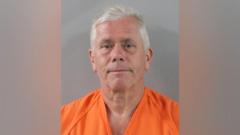The new facility, set to house around 1,000 detainees, poses significant ecological risks and raises alarms over the treatment of undocumented immigrants.
**Florida's 'Alligator Alcatraz': Controversial Migrant Detention Facility Takes Shape**

**Florida's 'Alligator Alcatraz': Controversial Migrant Detention Facility Takes Shape**
A former airport inside the Everglades is being repurposed as a migrant detention center amidst environmental and human rights concerns.
In the heart of the Everglades, a convoy of trucks is transforming a near-abandoned airport into a controversial new migrant detention facility unofficially dubbed "Alligator Alcatraz." Proposed by state lawmakers, this initiative aligns with former President Donald Trump's hardline immigration policies, providing a stark representation of the current administration's approach to border control.
The location, situated approximately 43 miles from downtown Miami, was previously known as the Dade-Collier Training and Transition Airport, primarily used for pilot training. The facility's design, as articulated by Florida’s Attorney General James Uthmeier in a social media video, suggests minimal investment in security measures. "If people get out," he stated, "there's not much waiting for them other than alligators and pythons."
This project emerges in response to a 2023 executive order from Florida Governor Ron DeSantis aimed at curtailing undocumented migration. The planned detention center is intended to manage up to 1,000 individuals and is expected to be operational by mid-summer. DeSantis hinted at future expansions, potentially paralleling this initiative at other state sites such as Camp Blanding.
The plans for "Alligator Alcatraz" coincide with an alarming escalation in national deportation efforts. The Immigration and Customs Enforcement (ICE) has reported record levels of detainees, significantly exceeding their capacity. Critics have vehemently expressed concerns not only about the overcrowding in detention facilities but also about the broader human rights implications of such measures.
Grassroots opposition is growing among local communities, especially among the Miccosukee Tribe. Community member Betty Osceola raised alarm over potential environmental degradation and inadequate living conditions for detainees, calling the setup a long-term venture rather than the temporary solution claimed by authorities. Her concerns reflect broader anxieties voiced by environmental activists and human rights organizations, including the ACLU of Florida, which argues that the immigration system is being weaponized as a punitive mechanism.
In response to these mounting challenges, Homeland Security Secretary Kristi Noem has assured that federal funding, sourced from FEMA, will expedite the facility's construction, presenting it as a crucial measure to fulfill America's immigration mandate. Meanwhile, Miami-Dade County's Democratic mayor, Daniella Levine Cava, has demanded clarity on how state authorities plan to address environmental and funding concerns associated with the project. As the debate intensifies, the future of undocumented individuals in Florida remains precarious, as fears of detention compel many to live in the shadows of society.




















